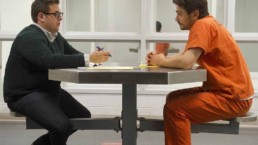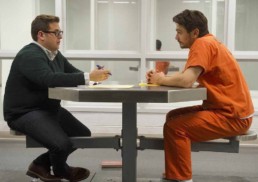Review: ‘True Story’
A criminally underserving thriller starring a beguiling James Franco.
As a by-product of evolving cultural shifts in American media consumption and reality-as-entertainment fixings, pop culture is currently having its obsession with real-life mysteries as main-stage pageantry. More specifically, this country-wide fascination takes the more perverse interest of real-life, unsolved American mysteries, centering around the horrific and gruesome acts of serial killing.
True Story, opening this weekend, is the latest of these hair-raising whodunits. The real life tale of Christian Longo, on the FBI’s Most Wanted list for murdering his wife and three children in Oregon, and afterwards hiding out using the identity of former disgraced New York Times writer Michael Finkel, who himself would later write a non-fiction book about these events, is the source material of the movie.
The elusive celebrity-meta questioner James Franco plays “Chris” Longo, in what could’ve been a real winner of actor and character transfusion: insert a detached media-savvy question mark with a possible smirky secret to tell to play a character of similar make-up, and have the artful A-lister run with it. But Franco’s half-commitments are insufferable, who offers only his most unimaginative stoner-shelled exterior to this character that needed to have the suspense of a waiting serpent’s sting to make this an interesting story. It doesn’t and therefore, it’s not.
True Story is the story of Longo’s relationship with Finkel, who, after using Finkel’s name as an alias, decides to give him the exclusive on his side of the story, and proving his innocence. It’s not so much a movie that wishes to provoke its viewer with real circumstantial evidence that points to heart-pounding conclusions, but rather a strung along bait and switch in which the movie, the whole time, teases the audience into wondering if he’s a fake or a phony, and it’s not nearly as half as interesting as one might expect it to be.
True Story won’t offer the sort of deliciously pulp-thrills of a more dialed in mystery/thriller, and leaves it stranded in ambiguously uncommitted territory.
The film’s most interesting viewpoint hinges on Finkel himself, who’s seen to have a more self-satisfying reason for taking part in the journalistic opportunity of a lifetime. After fabricating characters tied to a human-aid story in Africa, Finkel is let go from the Times, and his writing career is given the kiss of death. He relocates to Oregon to with his girlfriend Jill (Felicity Jones), whereupon he learns of Longo’s arrest and his stolen identity, which jumpstarts the focus of the film: Finkel and Longo meeting, and proceeding to build a trust and relationship surrounding each of them fulfilling the other’s baser emotional needs.
This leads to what should have been the most excitable part of the movie, the character of Finkel. A man whose previous sins as a publicly shamed liar could drive a more ambiguously feverish hunt of, is Finkel pursuing the mysterious Longo for journalism, or for a more consuming obsession that need to find redemption in proving someone’s innocence in a media landscape obsession and consumption with learning all about a potential serial killer who claims his innocence.
For the most part, Jonah Hill, as Finkel, is up to this challenge, turning in another dramatic effort that should add quite nicely to the thesp’s serious career. Hill comes in and maintains a nice guy touch, and appropriately shifts between a strategic and cautious investigator and impressionable sucker that wades too deep into a concocted reality that, as the film would have it, satisfy Finkel’s own fulfillments.
It’s Rupert Goold, first-time feature film director, who compartmentalizes the thing into underserved instances and diluted sequences, and, therefore, misses the movie’s larger mark. Most impressively, Goold leverages dead town landscapes that best served Bennet Miller’s Foxcatcher (and before that, Miller’s Capote). Snowy-blanketed plains offer a chilling and icy winter calm that frames the movie in an eerie isolated existence, but uninspired shooting during Finkel and Longo’s scenes, in the jail cell and courtroom offer meager, ultimately monotonous and unaffecting watching.
Goold’s further reluctance to throw in some more obvious Longo threat and string along the idea that he might just be a wrongfully accused guy deflates all senses of urgency. Add this to a story that isn’t structured to penetrate through any real discovery and all that’s left is a movie about two wandering egos searching for self-redemption in truth, that strays into too much wandering.
True Story won’t offer the sort of deliciously pulp-thrills of a more dialed in mystery/thriller, and leaves it stranded in ambiguously uncommitted territory. It’s with a sly wink that Franco should lure any unsuspecting viewer into this half-film, and if you’ve seen his and Hill’s party-bromance hijinks in This Is The End, it’ll take you a while to get past the absurdity that both would even attempt to star in such a serious project as this.
True Story opens this Friday.
Ryan Rojas
Ryan is the editorial manager of Cinemacy, which he co-runs with his older sister, Morgan. Ryan is a member of the Hollywood Critics Association. Ryan's favorite films include 2001: A Space Odyssey, The Social Network, and The Master.


